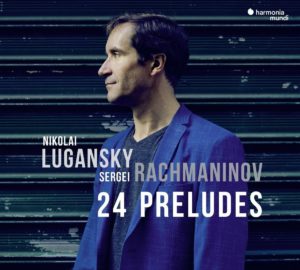Until now, Nikolai Lugansky has recorded prolifically but unevenly, bouncing around from label to label. However, Lugansky’s recent contract with Harmonia Mundi may well bring his recording career into focus, if this first release is any indication. Put simply, Lugansky’s remakes of Rachmaninov’s Op. 23 Preludes vastly improve upon his older, glibber Erato versions.
Articulation is more varied and three-dimensional this time around, and while tempos are generally broader, Lugansky’s tighter rhythms and wider berth of dynamics hold much more interest. Prelude No. 5’s lyrical central section’s inner voices now take pliable shape, and so do No. 2’s left-hand lines in relation to the right hand’s cascading chords. No. 4’s long cantabiles stretching from one register to the next gain urgency and intensity, while No. 7’s swirling figurations take on darker inflections. Lugansky also contrasts No. 9’s legato and detached double notes more distinctly and interestingly than before.
The Op. 32 Preludes cycle offers much to savor. It gets off to a rather heavy start in No. 1 (the dotted chords lack the scampering suppleness of Ashkenazy and Richter), but No. 3 abounds with energy and orchestral strength. By contrast, No. 5’s curvaceous filigree and magical chromatic touches in the coda elicit an impressive, Horowitz-like delicacy. Some listeners might find Lugansky’s teasing way with No. 7’s linear interplay mannered, but I rather like the resultant harmonic tension and heightened fantasy. No. 10 admittedly drags, although the central climax builds effectively. Not so in No. 12, where Lugansky’s tendency to get too loud too soon precludes any notion of shimmer and poetry. However, Lugansky’s concentration and control in the concluding D-flat major Prelude happily avoids lapsing into bombast in the final pages. The first half of the famous C-sharp minor Prelude is monumental, deliberate, and seemingly interminable, while Lugansky’s demonic twin thankfully presides over the second half.
Reservations aside, this pianist’s artistry has clearly evolved over time, and I look forward to wherever the Lugansky/Harmonia Mundi partnership might lead us next.
































